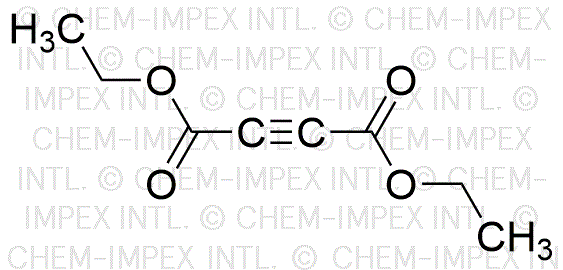Diethyl acetylenedicarboxylate is widely utilized in research focused on:
- Synthesis of Fine Chemicals: This compound serves as a versatile building block in organic synthesis, particularly in the production of fine chemicals and pharmaceuticals. Its unique structure allows for the formation of complex molecules through various reactions.
- Drug Development: In medicinal chemistry, it is used to create intermediates for drug candidates. Researchers leverage its reactivity to develop compounds that may lead to new therapeutic agents.
- Polymer Chemistry: It plays a crucial role in the synthesis of polymers and copolymers. The compound's ability to undergo polymerization reactions makes it valuable in creating materials with tailored properties for specific applications.
- Biochemical Research: This chemical is employed in the study of biochemical pathways and mechanisms. Its derivatives can be used to probe enzyme activity or to design inhibitors, aiding in the understanding of biological processes.
- Material Science: Diethyl acetylenedicarboxylate is used in the development of advanced materials, including coatings and adhesives. Its properties contribute to enhancing the performance and durability of these materials.
Información general
Propiedades
Seguridad y normativas
Aplicaciones
Diethyl acetylenedicarboxylate is widely utilized in research focused on:
- Synthesis of Fine Chemicals: This compound serves as a versatile building block in organic synthesis, particularly in the production of fine chemicals and pharmaceuticals. Its unique structure allows for the formation of complex molecules through various reactions.
- Drug Development: In medicinal chemistry, it is used to create intermediates for drug candidates. Researchers leverage its reactivity to develop compounds that may lead to new therapeutic agents.
- Polymer Chemistry: It plays a crucial role in the synthesis of polymers and copolymers. The compound's ability to undergo polymerization reactions makes it valuable in creating materials with tailored properties for specific applications.
- Biochemical Research: This chemical is employed in the study of biochemical pathways and mechanisms. Its derivatives can be used to probe enzyme activity or to design inhibitors, aiding in the understanding of biological processes.
- Material Science: Diethyl acetylenedicarboxylate is used in the development of advanced materials, including coatings and adhesives. Its properties contribute to enhancing the performance and durability of these materials.
Documentos
Hojas de datos de seguridad (HDS)
La SDS proporciona información de seguridad completa sobre la manipulación, el almacenamiento y la eliminación del producto.
Especificación del producto (PS)
La PS proporciona un desglose completo de las propiedades del producto, incluida la composición química, el estado físico, la pureza y los requisitos de almacenamiento. También detalla los rangos de calidad aceptables y las aplicaciones previstas del producto.
Certificados de análisis (COA)
Busque certificados de análisis (COA) ingresando el número de lote del producto. Los números de lote y de partida se pueden encontrar en la etiqueta de un producto después de las palabras "Lote" o "Lote".
Número de catálogo
Número de lote/lote
Certificados de origen (COO)
Este certificado de origen confirma el país en el que se fabricó el producto y también detalla los materiales y componentes utilizados en él y si se deriva de fuentes naturales, sintéticas u otras fuentes específicas. Este certificado puede ser necesario para cumplir con las normativas aduaneras, comerciales y regulatorias.
Número de catálogo
Número de lote/lote
Hojas de datos de seguridad (HDS)
La SDS proporciona información de seguridad completa sobre la manipulación, el almacenamiento y la eliminación del producto.
DownloadEspecificación del producto (PS)
La PS proporciona un desglose completo de las propiedades del producto, incluida la composición química, el estado físico, la pureza y los requisitos de almacenamiento. También detalla los rangos de calidad aceptables y las aplicaciones previstas del producto.
DownloadCertificados de análisis (COA)
Busque certificados de análisis (COA) ingresando el número de lote del producto. Los números de lote y de partida se pueden encontrar en la etiqueta de un producto después de las palabras "Lote" o "Lote".
Número de catálogo
Número de lote/lote
Certificados de origen (COO)
Este certificado de origen confirma el país en el que se fabricó el producto y también detalla los materiales y componentes utilizados en él y si se deriva de fuentes naturales, sintéticas u otras fuentes específicas. Este certificado puede ser necesario para cumplir con las normativas aduaneras, comerciales y regulatorias.


